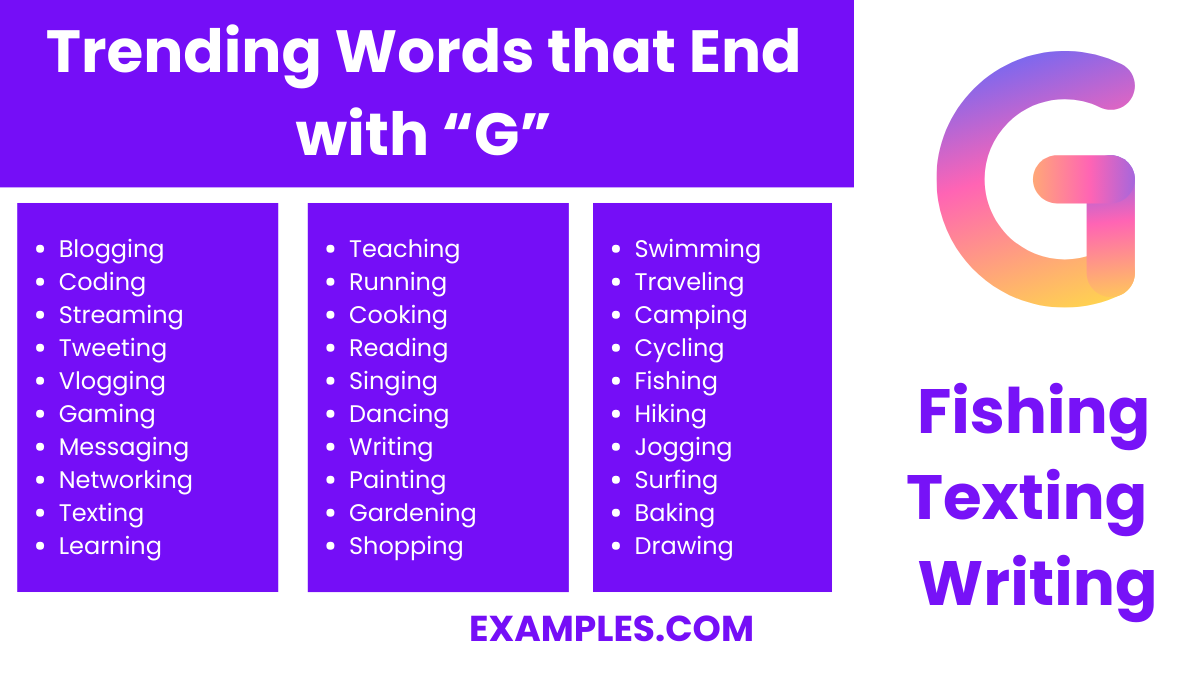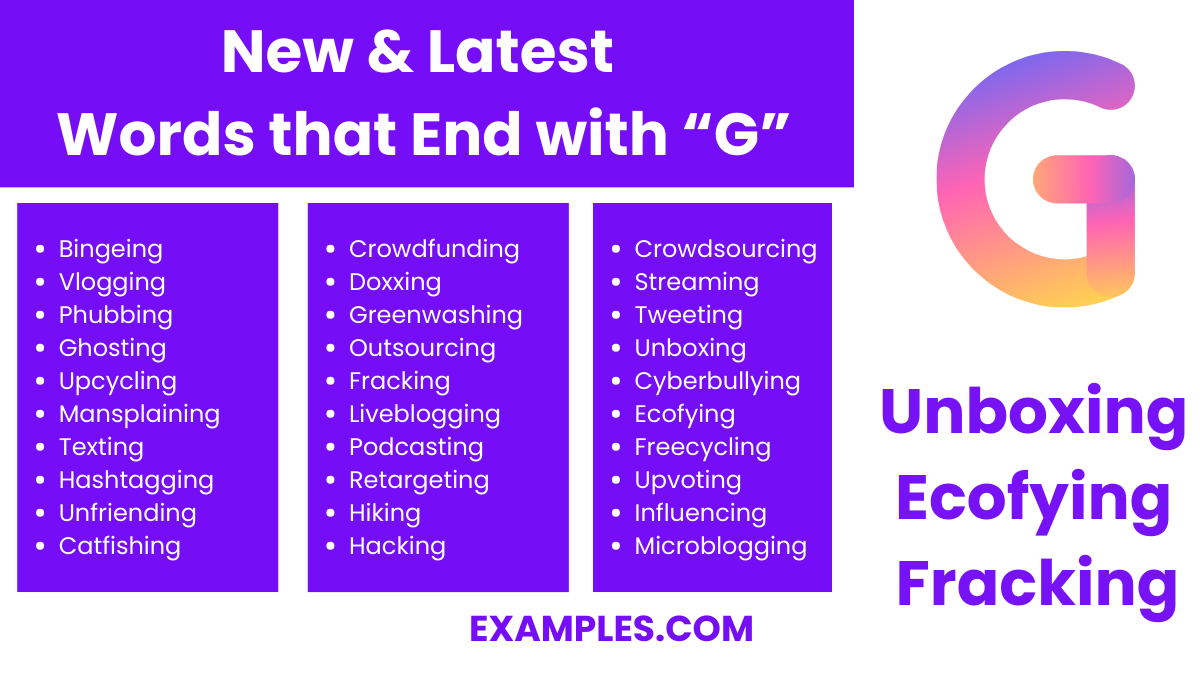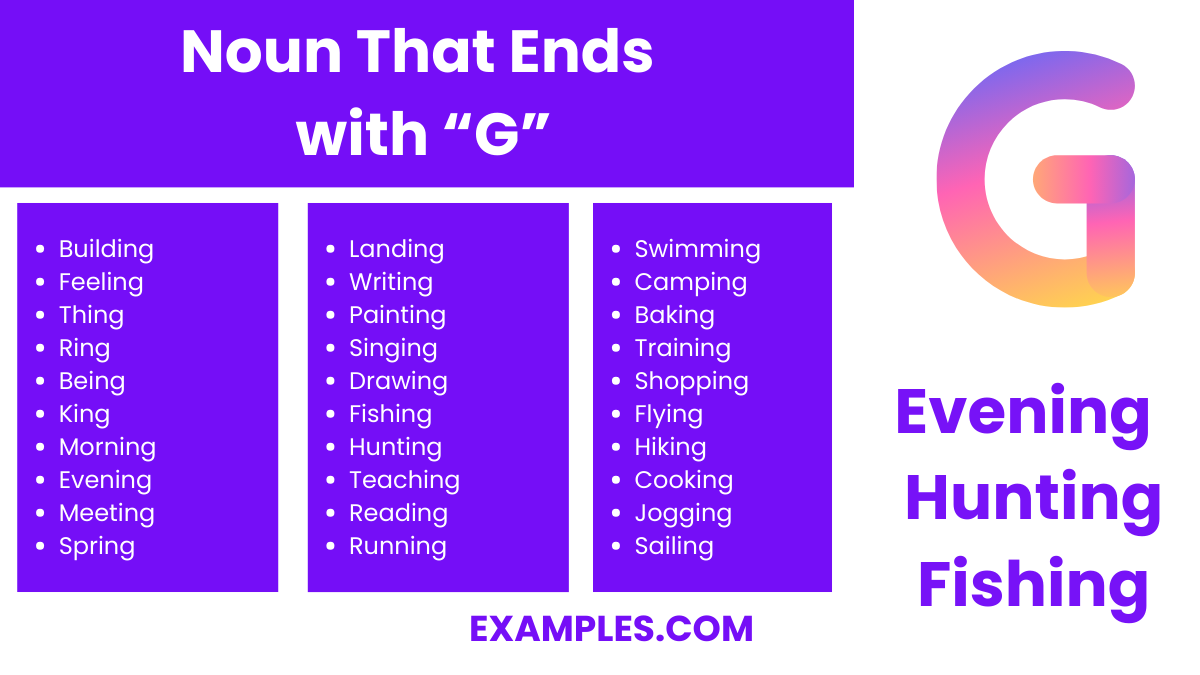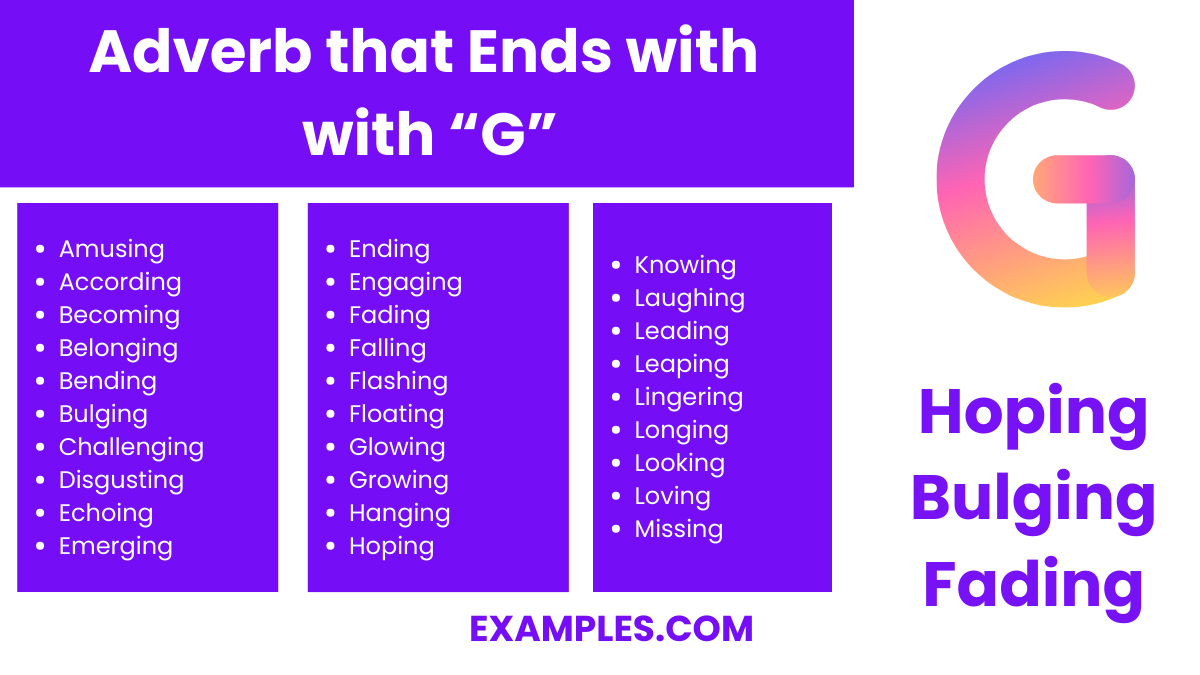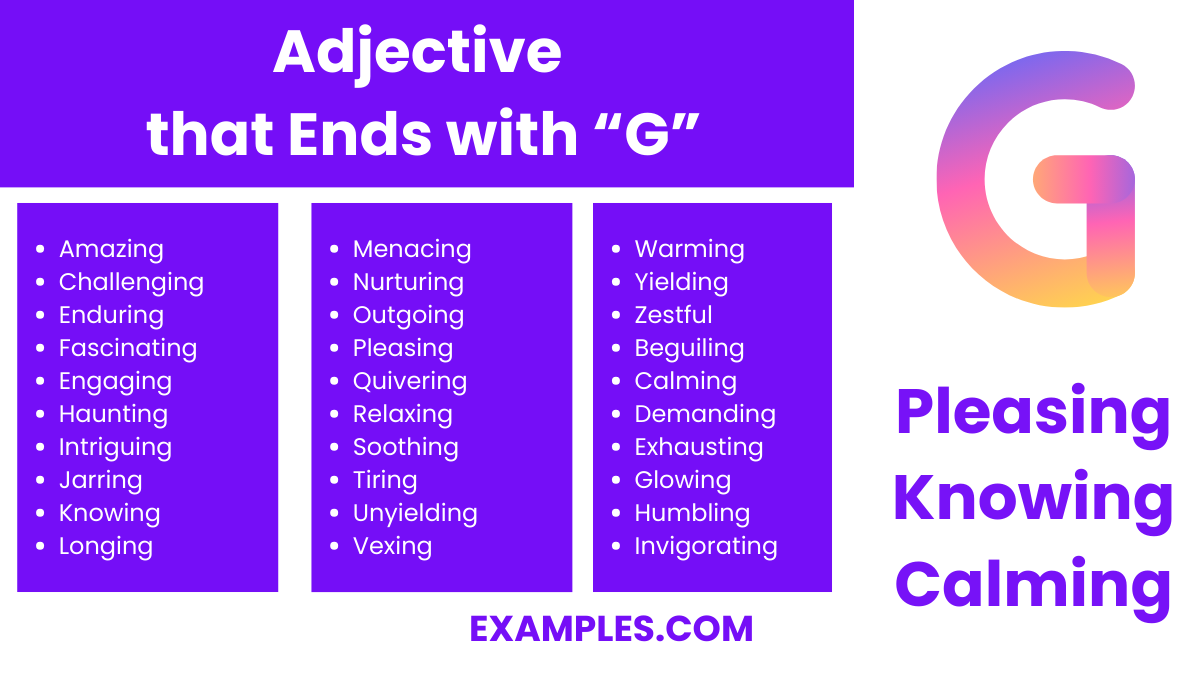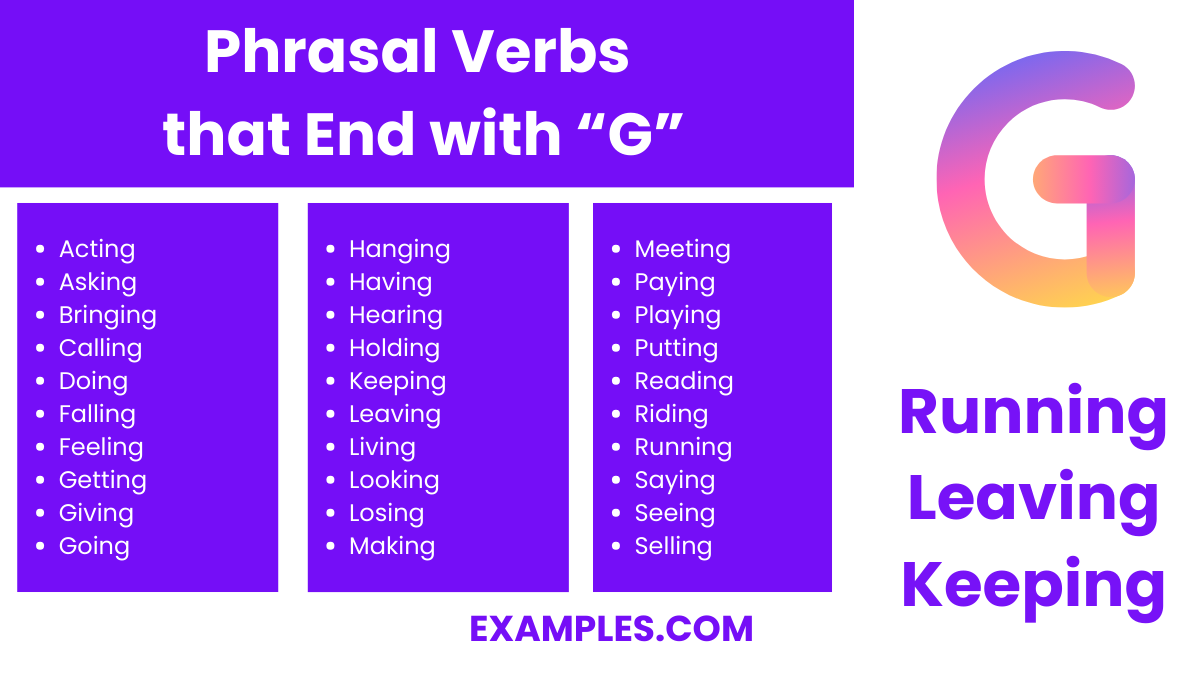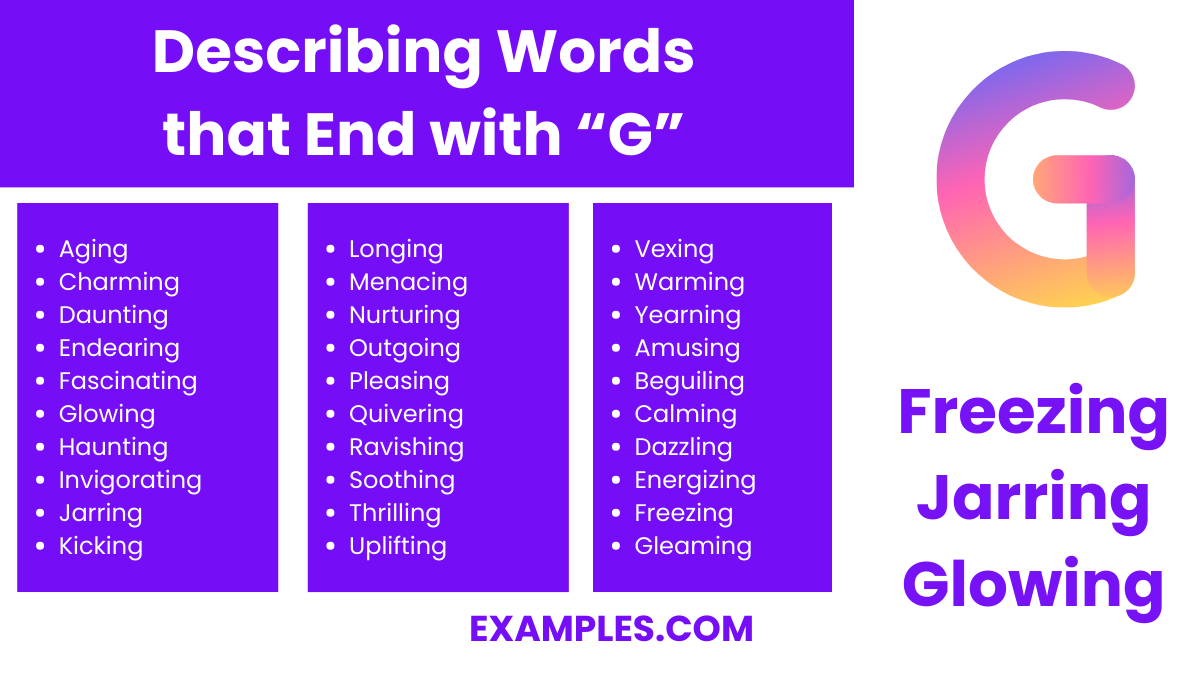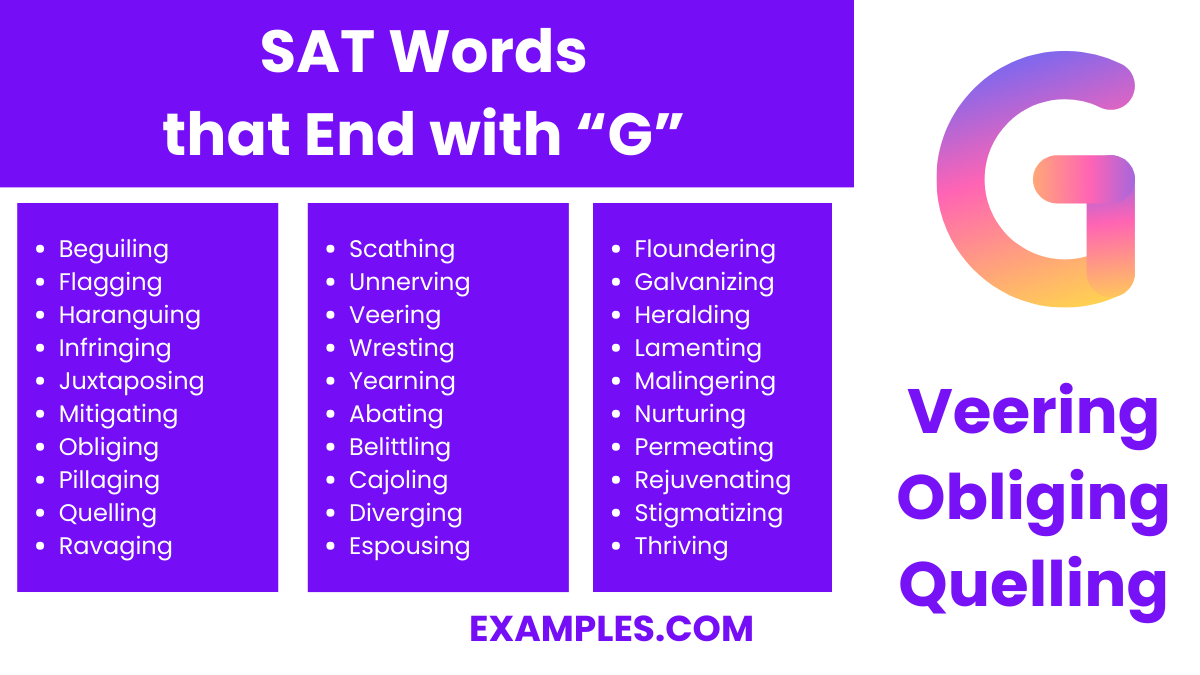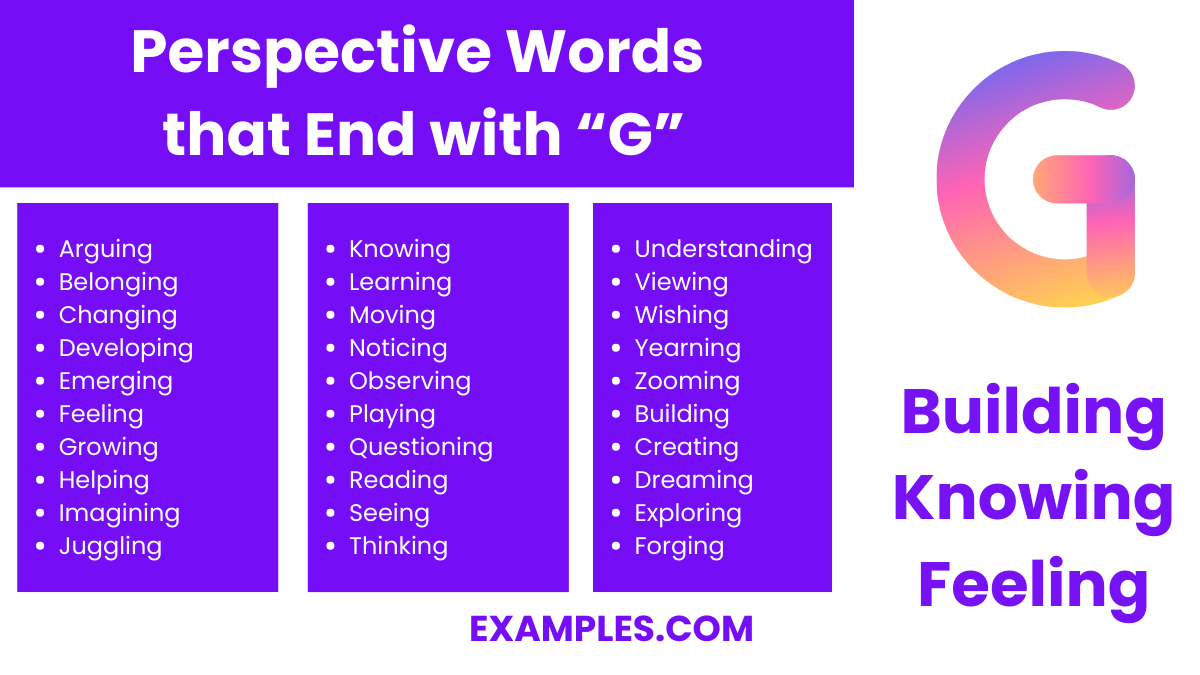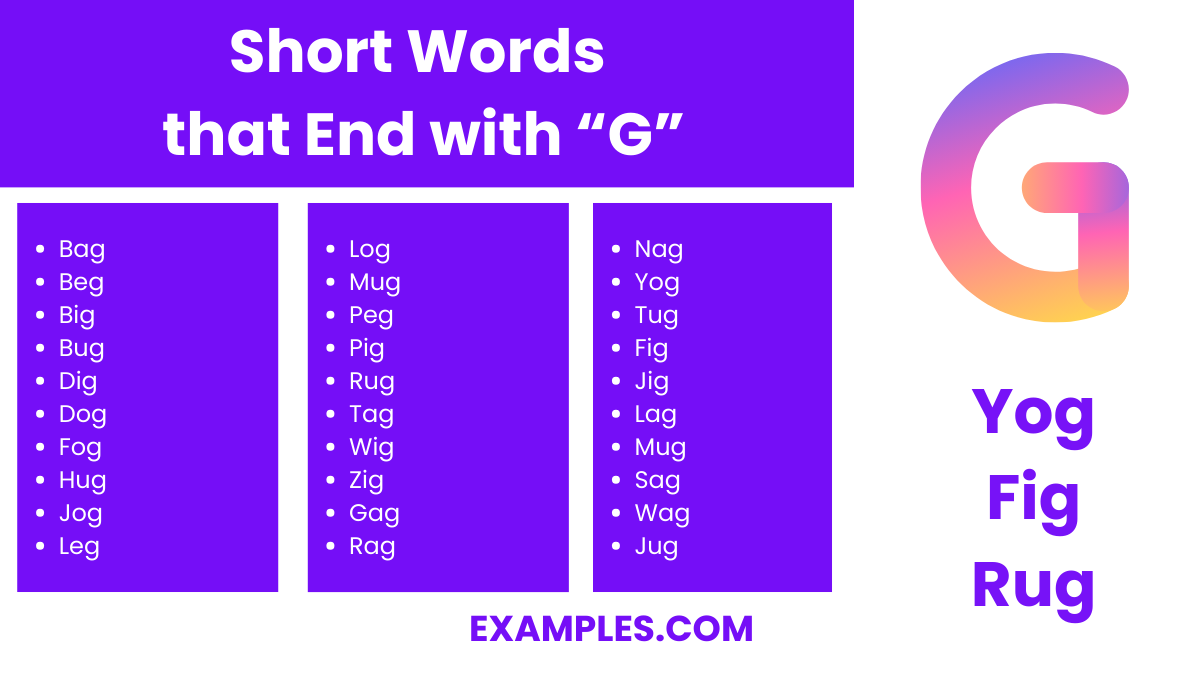150+ Words Ending With G List, Meaning, PDF
In the realm of English education, delving into words that terminate with ‘G’ unveils a trove of linguistic treasures, particularly beneficial for both pedagogues and learners. This collection, predominantly featuring verbs in their gerund or present participle form, is instrumental in crafting sentences brimming with vitality and motion. Educators harnessing these words within their pedagogical repertoire can significantly elevate students’ comprehension of action-oriented language and its perpetuity. Additionally, this focus serves as a conduit for deepening students’ insights into the subtleties of articulation and orthography. Engaging students through diverse, hands-on activities in utilizing these ‘G’ words ending fosters a more profound command of communication, ultimately enhancing their self-assurance and adeptness in English
Download Most Commonly Used Words Ending with G - PDF
150 Most Commonly Used Words Ending with “G”
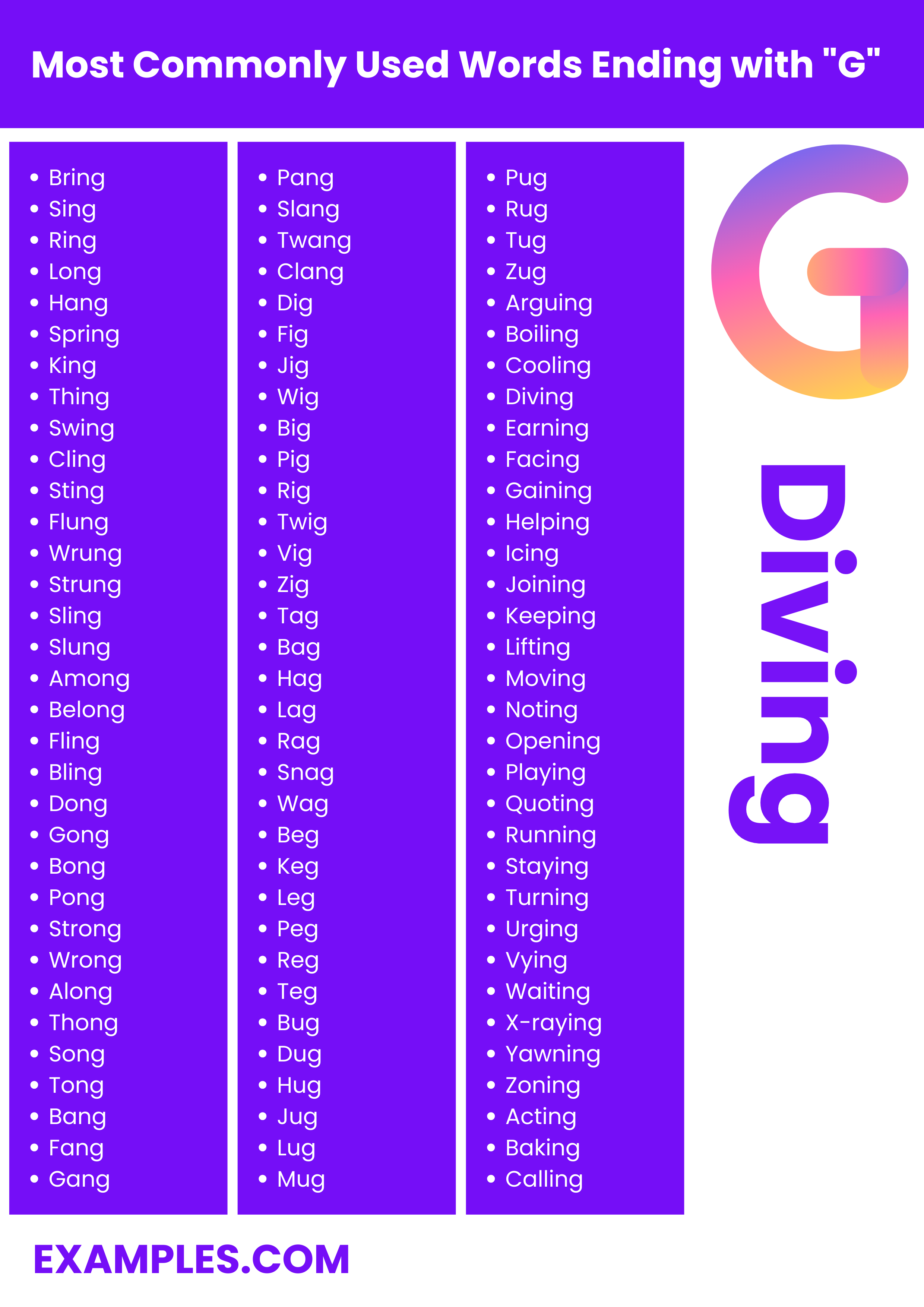
Focusing on words ending with ‘G’ is an excellent strategy for enhancing vocabulary and understanding of English phonetics. These words, often verbs in their gerund or present participle form, play a significant role in the language. Understanding their usage helps in mastering the nuances of English grammar and sentence construction. For teachers, this collection of words ending in ‘G’ can be a valuable resource for lesson planning, especially in teaching verb tenses, word formation, and language structure. These words provide a practical way to illustrate how English evolves and adapts in different contexts. Integrating them into classroom activities can make learning dynamic and engaging, helping students to improve their communication skills and overall language proficiency.
| Bring | Sing | Ring | Long | Hang | Spring |
| King | Thing | Swing | Cling | Sting | Flung |
| Wrung | Strung | Sling | Slung | Among | Belong |
| Fling | Bling | Dong | Gong | Bong | Pong |
| Strong | Wrong | Along | Thong | Song | Tong |
| Bang | Fang | Gang | Pang | Slang | Twang |
| Clang | Dig | Fig | Jig | Wig | Big |
| Pig | Rig | Twig | Vig | Zig | Tag |
| Bag | Hag | Lag | Rag | Snag | Wag |
| Beg | Keg | Leg | Peg | Reg | Teg |
| Bug | Dug | Hug | Jug | Lug | Mug |
| Pug | Rug | Tug | Zug | Arguing | Boiling |
| Cooling | Diving | Earning | Facing | Gaining | Helping |
| Icing | Joining | Keeping | Lifting | Moving | Noting |
| Opening | Playing | Quoting | Running | Staying | Turning |
| Urging | Vying | Waiting | X-raying | Yawning | Zoning |
| Acting | Baking | Calling | Driving | Eating | Fishing |
| Growing | Hiking | Ironing | Jumping | Kicking | Laughing |
| Mailing | Naming | Owning | Picking | Quitting | Racing |
| Seeking | Telling | Using | Visiting | Walking | Yearning |
| Zooming | Breathing | Cheering | Dancing | Exploring | Flying |
| Grinning | Hopping | Imagining | Joking | Knitting | Learning |
| Marching | Napping | Observing | Painting | Quelling | Resting |
| Singing | Teaching | Unveiling | Venting | Working | Yelling |
| Zigzagging | Beginning | Computing | Drawing | Exercising | Following |
| Gardening | Hosting | Investing | Judging | Kneeling | Listening |
| Mowing | Networking | Operating | Praying | Questioning | Reading |
| Skating | Travelling | Unfolding | Viewing | Whispering | Yelping |
Most Trending Words that End with “G”
In the dynamic world of English language education, keeping pace with trending words is crucial for impactful teaching. Words that conclude with ‘G’ are particularly noteworthy, as they frequently represent actions or ongoing processes, playing a pivotal role in understanding verb forms and grammar intricacies. For educators, integrating these ‘G’-ending words into pedagogical approaches not only broadens students’ lexical range but also deepens their grammatical comprehension. Providing learners with contemporary and widely used examples, such as Rhyming Words that capture phonetic patterns and Daily Use English Words that are integral to everyday communication, ensures their language skills are both current and practical. This compilation of trending words ending in ‘G’, carefully selected for their prevalence in modern dialogue, serves as a valuable resource for educators. It aids in enriching lesson content with diverse instances that highlight essential linguistic principles, thereby facilitating a more engaging and comprehensive learning experience.
- Blogging – Writing regular posts on a blog.
- Coding – Writing instructions for computer programs.
- Streaming – Transmitting or receiving data over the internet.
- Tweeting – Posting messages on Twitter.
- Vlogging – Creating and posting videos on a blog or social media.
- Gaming – Playing video games.
- Messaging – Sending electronic messages.
- Networking – Interacting with others to exchange information and develop contacts.
- Texting – Sending text messages via mobile devices.
- Learning – Acquiring knowledge or skills through experience or study.
- Teaching – Imparting knowledge or instructing someone.
- Running – Moving at a speed faster than a walk.
- Cooking – Preparing food by combining, mixing, and heating ingredients.
- Reading – Looking at and comprehending written or printed material.
- Singing – Making musical sounds with the voice.
- Dancing – Moving rhythmically to music.
- Writing – Marking coherent words on paper or another medium.
- Painting – Applying paint to a surface, or creating an image with paints.
- Gardening – Tending and cultivating a garden.
- Shopping – The act of visiting stores to buy goods.
- Swimming – Moving through water by moving limbs.
- Traveling – Making journeys; moving from place to place.
- Camping – Living temporarily in a tent or camp.
- Cycling – Riding a bicycle.
- Fishing – Catching fish as a hobby or profession.
- Hiking – Walking for long distances, especially across country.
- Jogging – Running at a steady, gentle pace.
- Surfing – Riding on waves on a surfboard.
- Baking – Cooking food by dry heat without direct exposure to a flame.
- Drawing – Producing images by making lines on paper.
New & Latest Words that End with “G”
Staying current with the evolving English language is crucial for both educators and learners. The language’s lexicon is continually expanding, with new words regularly enriching its repertoire. This compilation zeroes in on the freshest additions ending in ‘G’, shedding light on the linguistic innovations reflective of today’s societal, technological, and cultural landscapes. For teachers, weaving these contemporary words into pedagogical materials not only revitalizes instructional content but also ensures students’ linguistic competencies remain aligned with modern communicative demands. This selection, encompassing Christmas Words to bring seasonal cheer and Compound Words to explore linguistic creativity, serves not merely as a resource for broadening vocabulary but also as a lens into the fluidity and adaptability of the English language. Acquainting students with these terms empowers them with the verbal tools essential for thriving in our interconnected global community.
- Bingeing – The act of indulging excessively in an activity, especially eating or watching something.
- Vlogging – The activity of creating and posting videos on a blog.
- Phubbing – The act of snubbing someone in a social setting by looking at your phone instead of paying attention.
- Ghosting – The practice of ending a personal relationship with someone by suddenly and without explanation withdrawing from all communication.
- Upcycling – Reusing discarded objects or materials in such a way as to create a product of higher quality or value than the original.
- Mansplaining – A man explaining something to someone, typically a woman, in a manner regarded as condescending or patronizing.
- Texting – The action or practice of sending text messages.
- Hashtagging – The act of adding hashtags to a message or post on social media.
- Unfriending – The action of removing someone from a list of friends or contacts on a social networking site.
- Catfishing – The act of luring someone into a relationship by means of a fictional online persona.
- Crowdfunding – The practice of funding a project or venture by raising money from a large number of people, typically via the internet.
- Doxxing – The act of publicly revealing previously private personal information about an individual or organization, usually through the internet.
- Greenwashing – Disinformation disseminated by an organization so as to present an environmentally responsible public image.
- Outsourcing – Obtain (goods or a service) from an outside supplier, especially in place of an internal source.
- Fracking – The process of injecting liquid at high pressure into subterranean rocks to force open existing fissures and extract oil or gas.
- Liveblogging – To blog in real-time while an event is taking place.
- Podcasting – The practice of using the internet to make digital recordings of broadcasts available for downloading to a computer or mobile device.
- Retargeting – Online advertising that targets internet users who previously visited a particular website.
- Hiking – Walking for long distances, especially across country.
- Hacking – The gaining of unauthorized access to data in a system or computer.
- Crowdsourcing – The practice of obtaining information or input into a task or project by enlisting the services of a large number of people.
- Streaming – Transmitting or receiving data over the internet as a steady, continuous flow.
- Tweeting – The act of posting messages on the social media platform Twitter.
- Unboxing – The act of unpacking a new product, especially a high-tech consumer product, and examining its features, typically when filmed and shared on a social media site.
- Cyberbullying – The use of electronic communication to bully a person, typically by sending messages of an intimidating or threatening nature.
- Ecofying – The act of making something more environmentally friendly.
- Freecycling – The practice of exchanging unwanted goods, typically via the internet, rather than throwing them away.
- Upvoting – On a website that allows users to vote on content, give (something) a positive vote.
- Influencing – The capacity to have an effect on the character, development, or behavior of someone or something.
- Microblogging – The activity or practice of making short, frequent posts to a microblog.
Noun that Ends with “G”
Incorporating nouns ending with ‘G’ into educational content offers a distinctive approach to broadening students’ vocabulary and deepening their grasp of English linguistic structures. These nouns, often embodying actions or entities, play a crucial role in formulating cogent sentences and articulating intricate notions. Concentrating on this specific word termination enables educators to illuminate the processes behind gerund formation and the conversion of verbs into nouns, among other grammatical subtleties. These ‘G’-ending nouns, encompassing both Difficult Words to challenge learners and Encouraging Words to motivate them, not only enhance grammatical accuracy but also enrich students’ narrative capabilities across spoken and written mediums. This meticulously assembled collection of nouns concluding in ‘G’ serves as an essential tool for teachers striving to cultivate comprehensive linguistic proficiency and expressive agility in their students’ engagement with English.
- Building – A structure with a roof and walls.
- Feeling – An emotional state or reaction.
- Thing – An object that one need not, cannot, or does not wish to give a specific name to.
- Ring – A small circular band, typically of precious metal, worn on a finger.
- Being – The nature or essence of a person.
- King – A male monarch of a major territorial unit.
- Morning – The period of time between midnight and noon.
- Evening – The period of time at the end of the day.
- Meeting – An assembly of people for a particular purpose.
- Spring – The season after winter and before summer.
- Landing – A level area at the top of a staircase or between one flight of stairs and another.
- Writing – The activity or skill of marking coherent words on paper.
- Painting – A picture made using paint.
- Singing – The act of performing songs or tunes with one’s voice.
- Drawing – A picture or diagram made with a pencil, pen, or crayon.
- Fishing – The activity of catching fish.
- Hunting – The activity of hunting wild animals or game.
- Teaching – The occupation, profession, or work of a teacher.
- Reading – The action or skill of reading written or printed matter.
- Running – The action or movement of a runner.
- Swimming – The sport or activity of moving through water.
- Camping – The activity of spending a vacation living in a camp, tent, or camper.
- Baking – The process of cooking food by dry heat in an oven.
- Training – The action of teaching a person a particular skill or type of behavior.
- Shopping – The activity of buying goods from stores.
- Flying – The action of flying in the air.
- Hiking – The activity of going for long walks, especially in the country or woods.
- Cooking – The practice or skill of preparing food by combining, mixing, and heating ingredients.
- Jogging – The activity of running at a steady, gentle pace.
- Sailing – The sport or activity of using boats with sails.
Adverb that Ends with “G”
Focusing on adverb words ending in ‘G’ presents a unique and effective approach to enhancing English language proficiency. These adverbs, often overlooked, are pivotal in adding depth and precision to language expression. For educators, this list of adverbs ending in ‘G’ is an invaluable resource. It allows for the development of more dynamic lesson plans, especially in teaching adverbial usage, enhancing sentence construction, and enriching creative writing. Each adverb in this list not only expands a student’s vocabulary but also deepens their understanding of how adverbs modify verbs, adjectives, and even other adverbs. This can dramatically improve their communicative abilities, making them more adept and confident in their use of the English language.
- Amusing – In a manner that provides entertainment or enjoyment.
- According – As stated by or in.
- Becoming – In a manner that suits or enhances the appearance.
- Belonging – In a way that shows possession or relation.
- Bending – Moving or directing something to change direction.
- Bulging – Swelling in a protruding way.
- Challenging – In a manner that tests one’s abilities or resources.
- Disgusting – In a repulsive or sickening manner.
- Echoing – Producing a sound that reverberates.
- Emerging – Becoming apparent, important, or prominent.
- Ending – Concluding or terminating.
- Engaging – Attracting or holding interest or attention.
- Fading – Gradually growing weaker or less visible.
- Falling – Decreasing in number, magnitude, or intensity.
- Flashing – Shining in a bright but brief, sudden, or intermittent way.
- Floating – Moving or hovering smoothly and effortlessly.
- Glowing – Emitting a steady, soft light.
- Growing – Increasing in size or amount.
- Hanging – Suspended in the air.
- Hoping – In a manner full of hope.
- Joking – Speaking or acting in a humorous way.
- Knowing – Showing or suggesting that one has knowledge or awareness.
- Laughing – Making the spontaneous sounds and movements of the face and body that are the instinctive expressions of lively amusement.
- Leading – In a position that guides or directs.
- Leaping – Jumping or springing a long way.
- Lingering – Remaining or staying in a place longer than is usual or expected.
- Longing – Having a strong desire or yearning.
- Looking – Directing one’s gaze in a specified direction.
- Loving – Feeling or showing love or great care.
- Missing – In a manner that shows something is not present or lacking.
Adjective that Ends with “G”
Focusing on adjectives that conclude with ‘G’ can significantly enrich students’ vocabulary, injecting vibrancy and precision into their language. These adjectives are key in enabling students to express their thoughts and emotions with greater clarity. For educators, this set of words is invaluable for teaching descriptive language skills, making it a vital component in enhancing students’ writing and speaking capabilities. By employing these adjectives, communication becomes more vivid and compelling, especially useful in creative writing and analytical discussions. This selection of adjectives ending in ‘G’, complete with definitions, is especially advantageous for boosting language fluency. Including Funny Words adds an element of humor and engagement, while Ness Words help explore qualities and states, further broadening students’ understanding and application of these descriptive terms in diverse settings
- Amazing – Causing great surprise or wonder; astonishing.
- Challenging – Testing one’s abilities; demanding.
- Enduring – Lasting over a period of time; durable.
- Fascinating – Extremely interesting.
- Engaging – Charming and attractive.
- Haunting – Poignant and evocative; difficult to ignore or forget.
- Intriguing – Arousing one’s curiosity or interest; fascinating.
- Jarring – Incongruous, inharmonious, or at odds with.
- Knowing – Showing or suggesting that one has knowledge or awareness that is secret or known to few.
- Longing – Having or showing a yearning desire.
- Menacing – Suggesting the presence of danger; threatening.
- Nurturing – Caring for and encouraging the growth or development of.
- Outgoing – Friendly and socially confident.
- Pleasing – Satisfying or appealing.
- Quivering – Trembling or shaking with a slight rapid motion.
- Relaxing – Reducing tension or anxiety.
- Soothing – Having a gently calming effect.
- Tiring – Causing one to feel exhausted; fatiguing.
- Unyielding – Not giving way to pressure; hard or solid.
- Vexing – Causing annoyance, frustration, or worry.
- Warming – Making one feel pleasantly warm.
- Yielding – Producing or providing something, such as a profit or crop.
- Zestful – With great enthusiasm and energy.
- Beguiling – Charming or enchanting, often in a deceptive way.
- Calming – Causing to become tranquil; soothing.
- Demanding – Requiring much skill or effort.
- Exhausting – Making one feel very tired; very tiring.
- Glowing – Expressing great praise.
- Humbling – Making one feel less important or proud.
- Invigorating – Making one feel strong, healthy, and full of energy.
Phrasal Verbs that End with “G”
Phrasal verbs that terminate with ‘G’ are fundamental components of the English language, bringing vibrancy and dynamism to expression. For educators, these verbs are indispensable in elucidating the subtleties of English vocabulary and grammatical structures. Typically composed of a verb coupled with an adverb or preposition, these ‘G’-ending phrasal verbs often denote ongoing actions or processes, integral for grasping conversational English and elevating students’ communicative prowess. Predominant in both colloquial and formal discourse, their mastery is key to a well-rounded language education. Embedding these phrasal verbs in educational content, particularly those classified as Vowel Words for phonetic emphasis and Sight Words for reading fluency, enables teachers to showcase practical language applications, making learning both immersive and efficacious.
- Acting – To perform a role in a play, movie, or television.
- Asking – To request information or an answer.
- Bringing – To carry or transport to the designated place.
- Calling – To shout out or try to communicate with someone.
- Doing – To perform an action or task.
- Falling – To drop or descend under the force of gravity.
- Feeling – Experiencing a sensation or emotion.
- Getting – To acquire, receive, or earn something.
- Giving – To present voluntarily without expecting anything in return.
- Going – To move or travel to a place.
- Hanging – To suspend or be suspended from above with the lower part dangling.
- Having – To possess, own, or hold.
- Hearing – To perceive with the ear the sound made by someone or something.
- Holding – To grasp, carry, or support with one’s arms or hands.
- Keeping – To retain or continue to have possession of.
- Leaving – To go away from.
- Living – To have one’s home somewhere; to exist.
- Looking – To direct one’s gaze towards someone or something.
- Losing – To be deprived of or cease to have.
- Making – To create or construct something.
- Meeting – To come into the presence or company of someone by chance or arrangement.
- Paying – To give (someone) money that is due for work done, goods received, or a debt incurred.
- Playing – To engage in activity for enjoyment and recreation.
- Putting – To move to or place in a particular position.
- Reading – To look at and comprehend the meaning of written or printed matter.
- Riding – To sit on and control the movement of a bicycle, horse, or motorcycle.
- Running – To move at a speed faster than a walk.
- Saying – To utter words or articulate sounds with the ordinary voice.
- Seeing – To perceive with the eyes.
- Selling – To give or hand over something in exchange for money.
Describing Words that End with “G”
Describing words, or adjectives, ending with ‘G’ play a pivotal role in enriching English language communication. For teachers, these words are an indispensable tool in guiding students to vividly express thoughts, emotions, and descriptions. This set of adjectives adds depth and clarity to speech and writing, allowing students to convey their messages more effectively. Focusing on words ending in ‘G’ can enhance students’ understanding of nuances in word formation and usage. These words are essential for creating vivid imagery and precise descriptions in storytelling, essay writing, and daily conversations. Utilizing these words can significantly improve students’ vocabulary, making their communication more expressive and impactful.
- Aging – Becoming older.
- Charming – Pleasant or attractive.
- Daunting – Seeming difficult to deal with; intimidating.
- Endearing – Inspiring affection or warmth.
- Fascinating – Extremely interesting.
- Glowing – Giving out light; shining or luminous.
- Haunting – Poignant and evocative; difficult to ignore or forget.
- Invigorating – Making one feel strong, healthy, and full of energy.
- Jarring – Causing a shock or jolt; incongruous.
- Kicking – Lively and active.
- Longing – Having a yearning or desire.
- Menacing – Suggesting the presence of danger; threatening.
- Nurturing – Providing care and encouragement to grow.
- Outgoing – Friendly and socially confident.
- Pleasing – Attractive or agreeable.
- Quivering – Trembling or shaking with a slight rapid motion.
- Ravishing – Delightful; enchanting.
- Soothing – Having a gently calming effect.
- Thrilling – Causing excitement and pleasure; exhilarating.
- Uplifting – Morally or spiritually elevating; inspiring happiness or hope.
- Vexing – Causing annoyance, frustration, or worry.
- Warming – Making one feel pleasantly warm.
- Yearning – A feeling of intense longing for something.
- Amusing – Causing laughter or providing entertainment.
- Beguiling – Charming or enchanting, often in a deceptive way.
- Calming – Causing to become tranquil; soothing.
- Dazzling – Extremely impressive, beautiful, or skillful.
- Energizing – Giving vitality and enthusiasm.
- Freezing – Very cold.
- Gleaming – Shining brightly, especially with reflected light.
SAT Words that End with “G”
In preparing students for the SAT, a key aspect is expanding their vocabulary, particularly with words that may not be commonly used in everyday language. Focusing on words ending in ‘G’ offers a unique opportunity to delve into a variety of complex and high-value terms. These SAT words often involve intricate meanings and connotations, making them ideal for the critical reading and writing sections of the SAT. For educators, this collection of SAT words is an invaluable tool for enhancing lesson plans, enriching vocabulary sessions, and providing students with a competitive edge. Each word in the list is not only a vocabulary enhancer but also a window into advanced English usage, encouraging students to appreciate the depth and breadth of the language. Understanding and utilizing these words can significantly bolster a student’s SAT performance, particularly in comprehension and essay writing.
- Beguiling – Charming or enchanting, often in a deceptive way.
- Flagging – Becoming tired or less dynamic; declining in strength.
- Haranguing – Delivering a lengthy and aggressive speech.
- Infringing – Actively breaking the terms of a law or agreement.
- Juxtaposing – Placing or dealing with close together for contrasting effect.
- Mitigating – Making less severe, serious, or painful.
- Obliging – Willing to do a service or kindness; helpful.
- Pillaging – Robbing a place using violence, especially in wartime.
- Quelling – Putting an end to (a rebellion or other disorder), typically by force.
- Ravaging – Causing severe and extensive damage.
- Scathing – Witheringly scornful; severely critical.
- Unnerving – Causing one to lose courage or confidence; disconcerting.
- Veering – Changing direction suddenly.
- Wresting – Forcibly pulling something from a person’s grasp.
- Yearning – Having an intense feeling of longing for something.
- Abating – Becoming less intense or widespread.
- Belittling – Making someone or something seem less impressive or important.
- Cajoling – Persuading someone to do something by sustained coaxing or flattery.
- Diverging – Developing in different directions.
- Espousing – Adopting or supporting a cause or belief.
- Floundering – Struggling mentally; showing or feeling great confusion.
- Galvanizing – Shocking or exciting someone into taking action.
- Heralding – Announcing or signaling the approach of.
- Lamenting – Mourning a person’s loss or death.
- Malingering – Exaggerate or feign illness in order to escape duty or work.
- Nurturing – Caring for and encouraging the growth or development of.
- Permeating – Spreading throughout something.
- Rejuvenating – Making someone feel or look young, healthy, or energetic again.
- Stigmatizing – Describing or regarding as worthy of disgrace or great disapproval.
- Thriving – Prospering; flourishing.
Perspective Words that End with “G”
Enhancing students’ vocabulary with words ending in ‘G’ offers a unique angle in language learning, particularly when focusing on ‘perspective’ words. These words, rich in meaning, are instrumental in describing viewpoints, actions, and processes, making them essential for expressive communication. For teachers, this approach is a goldmine for lesson planning, encouraging students to articulate thoughts and observations with clarity. These ‘G’ ending words can be woven into discussions, writing assignments, and reading comprehension exercises, enriching students’ linguistic abilities. Their use in various contexts, from creative storytelling to analytical writing, helps students grasp the subtleties of the English language. The list below, tailored for educational use, includes 35 perspective words ending in ‘G’, each with its definition, perfect for expanding students’ vocabulary and enhancing their understanding of different perspectives.
- Arguing – Presenting reasons for or against a thing.
- Belonging – Being a member or part of a particular group.
- Changing – Making or becoming different.
- Developing – Growing or causing to grow and become more mature.
- Emerging – Becoming apparent, important, or prominent.
- Feeling – Experiencing an emotional state or reaction.
- Growing – Undergoing natural development by increasing in size and changing physically.
- Helping – Giving assistance or support to others.
- Imagining – Forming new ideas, images, or concepts not present to the senses.
- Juggling – Cope with by adroitly balancing.
- Knowing – Possessing knowledge or information about something.
- Learning – Acquiring knowledge or skill through study or experience.
- Moving – Changing position or going from one place to another.
- Noticing – Becoming aware of something.
- Observing – Noticing or perceiving something and registering it as significant.
- Playing – Engaging in an activity for enjoyment and recreation.
- Questioning – Asking questions or expressing doubt.
- Reading – Looking at and comprehending the meaning of written or printed matter.
- Seeing – Perceiving with the eyes; discerning visually.
- Thinking – Forming thoughts or ideas in the mind.
- Understanding – Perceiving the intended meaning of words, a language, or a speaker.
- Viewing – Looking at or inspecting something.
- Wishing – Feeling or expressing a strong desire or hope for something that cannot or probably will not happen.
- Yearning – Having an intense feeling of longing for something.
- Zooming – Moving quickly or happening quickly.
- Building – Constructing something by putting parts or materials together.
- Creating – Bringing something into existence.
- Dreaming – Experiencing dreams while sleeping.
- Exploring – Traveling through an unfamiliar area to learn about it.
- Forging – Creating a relationship or new conditions.
Short Words that End with “G”
Focusing on short words ending with ‘G’ is a fantastic strategy for teachers to enhance the language skills of their students. These words, often action-oriented and dynamic, are crucial for understanding English verb tenses, particularly the present participle. Incorporating these words into classroom activities can greatly assist in teaching the nuances of English grammar and vocabulary. The list below not only includes words that are practical for everyday use but also those that are rich in linguistic value. These words are perfect for creating engaging and interactive lessons, from spelling tests to creative writing exercises. Understanding and effectively using these words can significantly improve students’ communication skills, making them more confident and proficient in the English language.
- Bag – A container made of flexible material with an opening at the top.
- Beg – To ask someone earnestly or humbly for something.
- Big – Of considerable size or extent.
- Bug – A small insect.
- Dig – To break up and move earth with a tool or machine, or with hands, paws, snout, etc.
- Dog – A domesticated carnivorous mammal.
- Fog – A thick cloud of tiny water droplets suspended in the atmosphere.
- Hug – To squeeze someone tightly in one’s arms.
- Jog – To run at a steady gentle pace.
- Leg – Each of the limbs on which a person or animal walks and stands.
- Log – A part of a tree trunk or a large branch.
- Mug – A large cup with a handle, used for drinking hot beverages.
- Peg – A short cylindrical piece of wood, metal, or plastic, typically used for hanging things on.
- Pig – A domesticated mammal with a snout for a nose, short legs, and a thick body.
- Rug – A floor covering of thick woven material or animal skin.
- Tag – A label attached to someone or something for identification or other information.
- Wig – A covering of artificial or natural hair worn on the head.
- Zig – To move or proceed with sharp changes of direction.
- Gag – A device put into or over the mouth to prevent speaking or shouting.
- Rag – A piece of old cloth, especially one torn from a larger piece.
- Nag – To annoy or irritate with persistent fault-finding or continuous urging.
- Yog – A colloquial term for yoga.
- Tug – To pull something hard or suddenly.
- Fig – A soft pear-shaped fruit with sweet dark flesh and many small seeds.
- Jig – A lively dance with leaping movements.
- Lag – To fall behind in movement, progress, or development.
- Mug – To attack and rob someone in a public place.
- Sag – To sink, subside, or bulge downward under weight or pressure.
- Wag – (of a dog’s tail) to move back and forth or up and down.
- Jug – Jar to store water.
In conclusion, focusing on words ending with ‘G’ is a highly effective method for enriching students’ vocabulary and understanding of English. These words are pivotal in grasping verb tenses and participles. Teachers should emphasize their pronunciation, contextual use, and integration in various linguistic exercises. Regular practice with these words will not only improve students’ communication skills but also deepen their appreciation of the language’s structure and flow.



